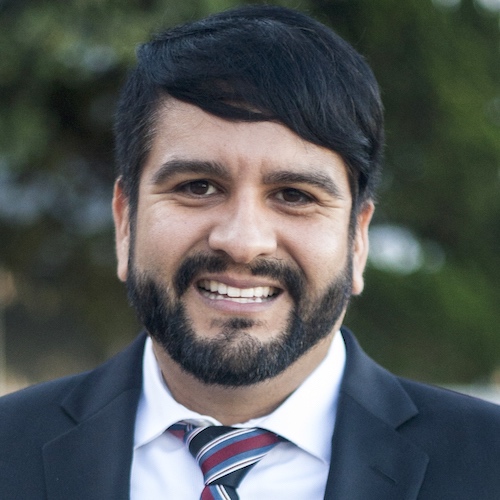Celebrating unsung heroes during National Family Caregivers Month
November 25, 2020
November is National Family Caregivers Month, a nationwide observance that recognizes those who dedicate their time and effort towards caring for family members in need. It is a time to celebrate the contributions of family caregivers and praise their strength and support. Within occupational therapy, including the family in treatment provides a wealth of benefits, and families can also act as a catalyst for further healing and engagement.
Six members of the USC Chan Division — faculty members Allison Chu, Celso Delgado, Janet Gunter, Stacey Schepens Niemiec, and students Delaney Smith MA ’21 and Adam Strizich MA ’21 — discuss the importance of including families in occupational therapy.
Clinical Faculty Health and Wellness
Chu: It’s often been said that when you get married, you’re not just marrying that person but you’re marrying their family as well. Similarly with OT, when you’re working with a client, you’re not just working with the client but you’re also working with the client’s family because they are an important part of the client’s identity. Being able to understand a client’s family system and the family dynamic and integrating that into the client–therapist relationship can definitely impact your client’s progress in a significant way. Family members know their loved one’s personality, their occupational history, their likes and dislikes, and their habits, routines and preferences. They are also the client’s biggest cheerleader, supporting them throughout the ups and downs of their recovery process. They can provide emotional and social support, and help the client with reclaiming former roles as well as reintegrating back into the community. They will also be the ones to continue to provide that support after the client has completed their OT program.
Delgado: Families can contribute to a person’s treatment and healing process in many ways. To start, relationships with family members create opportunities for engagement. From ordinary daily activities, such as preparing and having meals together, to celebrating cultural or family customs with one another, being engaged in meaningful occupations with others plays a significant role in recovery in the lives of people with mental illness. A person may agree in their treatment plan for a family member to provide encouragement, verbal reminders or assistance with applying effective coping strategies so that they remain stable or maintain their daily routine when they are having a hard day. For a person living with mental illness, being able to give to others is just as important as the support they receive from others. Having close relations with family can provide many opportunities to give, which is not only super powerful, but also contributes to the healing process.
Gunter: Family caregivers are my superheroes. In my work as a pediatric occupational therapist, I am constantly in awe of their resilience and dedication. When working with children, it is important to remember what our experience and the research constantly tells us — that family caregivers are essential to the success of the interventions we provide. Including and valuing them as experts allows for a collaborative relationship with the family that helps guide intervention planning. In pediatrics, family caregivers are often the child’s biggest advocate and it is important that their voices are not only heard but integrated into the treatment process. Family caregivers serve as the leading and stable characters in their child’s journey. As occupational therapists, we are there to support their journey in positive ways.
Schepens Niemiec: When working with the older adult population, it is vitally important to consider family and families of choice as integral components of the intervention plan. Family care partners play key roles in providing physical, mental, emotional, social and/or functional support that can facilitate aging-in-place, and oftentimes, do so without pay or ample consideration for their own health and wellbeing. When faced with health challenges, an older adult’s care needs can steadily increase as the quantity and severity of their chronic conditions advance, or while functional limitations and disability progress. Family care partners can extend the care that health services may fail to provide. They serve as experts with lived experience, and can offer valuable insight into the needs and goals of the older adult. Moreover, family care partners bring unique, intimate and equally important perspectives of a situation that an outside care provider could not have alone. For older adults who may not have the capacity to express themselves independently, family care partners can be their voice, helping to focus intervention on meaningful occupation, ensuring the older adult’s dignity is preserved and assisting providers in delivering client-centered, high-quality care.
Strizich: As future occupational therapists, our mission is to provide holistic care to our clients by developing a deep understanding of their condition and how it impacts their daily life. As such, we recognize that family plays an essential role in the healing process for our clients, and that best practice is to collaborate with families to create and implement client treatment plans. Family is truly the key ingredient to optimizing outcomes for clients receiving OT services. They can offer a wealth of valuable information about a client which is why many standard OT practices will incorporate a family interview when developing the client’s occupational profile. The family is also often responsible for helping clients to follow through on the goals set in therapy, which may include completing a home exercise program or engaging in a community-based activity. Families offer social support and encouragement which increases resiliency in the face of extremely difficult life circumstances.
Smith: I discovered occupational therapy when my grandmother began receiving services after her stroke. My uncle was her caretaker, and I saw his level of stress decrease as my grandmother began to regain her independence. As a current student, and based on my own experiences, I have come to further recognize the importance of including the family in treatment. No matter the setting, including the family and caregivers in the treatment plan is integral for a holistic lens. The OT can only gain so much insight into their clients. But family and caregivers know clients well. They are as much a part of the team as we are. As future occupational therapists, we can support family members by providing resources, suggesting support groups and educating them on safety. In my future practice as a clinician, I hope to collaborate with the client and their loved ones throughout the therapy process. For many, life is not truly fulfilled without family, whether they are blood-related or not. As occupational therapists, that is our goal.
⋯
Next by tag Clinical ⟩ Faculty ⟩ Health and Wellness ⟩











